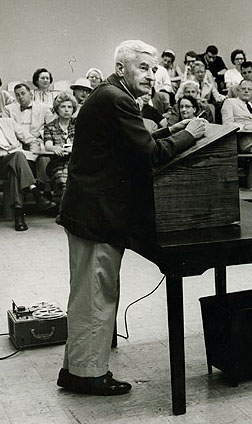Audio Clips
| CLOSE WINDOW TO RETURN TO MAP |

 Photograph by Ralph Thompson © Rector and Visitors, University of Virginia |
During the 1957 and 1958 Spring semesters, William Faulkner was the Writer-in-Residence at the University of Virginia. During that time he appeared at thirty-six different public events, reading from his work and answering over 1400 questions from students, faculty and others. Thanks to two members of the Department of English, Frederick Gwynn and Joseph Blotner, most of those sessions were recorded, and preserved on tape in the University of Virginia Special Collections Library. Over 28 hours of the recordings have been digitized, and are available online in the Faulkner at Virginia audio archive . The mp3 clips available below have been taken from that archive, and are playable on most devices. How was Sanctuary written? (27 April 1957; 2:10) Is the novel about "the rape of the South"? (15 April 1957; 0:32) Does Popeye's character stand for something? (13 April 1957; 0:37) Narcissa's character in two different novels. (15 February 1957; 1:23) |
How was Sanctuary written? (27 April 1957; 2:10)
William Faulkner: Yes, sir.
Unidentified participant: In the book Sanctuary, could you tell us how you feel about the story, or what brought you to write it, to bring it out—?
William Faulkner: I have told this before. If any of you were at the class and heard it, please forgive us. I had written several books. I didn't need money then because I was single and footloose, and there were things I could do for money. I was a bootlegger. I was a commercial aeroplane pilot. Then I got married, and I needed money, and I had—had got the curse of writing then, so I thought I would make a little money writing a book, and I thought of the most horrific story I could imagine and wrote it, sent it to the publisher and he wrote back, "Good God, if we print this, we'll both be in jail." [audience laughter] So I wrote two more books and forgot about it. Then one day I got the galley proofs of Sanctuary, and I looked at it, and I didn't need money then probably, though I like to think that I had gotten my breath and could see that the whole thing was basely conceived for a base purpose, and I wrote the publisher, "Let's throw it away." He said, "We can't do that because I have spent money to have plates made." And I said, "Well, I'll have to rewrite it because I can't let it be printed this way." And he said, "All right, if you will pay your half of the new plates, I'll pay half, and you can rewrite it." So I got a job and earned the two hundred and seventy dollars to pay my half of the new plates and rewrote the book, and this time, I did the best I could with it. I'm—I'm not ashamed of the book as it is. I'm ashamed of the—the primary base notion to write something to make money, which I shouldn't have done, that I—I betrayed something somewhere when I—when I did that, but I did the best I could with the material as it was, and so I'm not ashamed of the book now. It's not one that I would do again, but I'm not ashamed of it.
Is the novel about "the rape of the South"? (15 April 1957; 0:32)
William Faulkner: Yes, ma'am.
Unidentified participant: In reference to Sanctuary, when you were writing this, did you have in mind anything like the rape of the South? I mean, there's been a lot of talk about that. Did you have that in mind when you wrote —
William Faulkner: No—
Unidentified participant: Either time?
William Faulkner: No. I was simply writing a story which I thought somebody might pay some money for.
Unidentified participant: The first instance?
William Faulkner: Yes, and the second time I was trying to make the best I could out of something that was going to cost me two hundred and seventy dollars. [audience laughter]
Does Popeye's character stand for something? (13 April 1957; 0:37)
William Faulkner: Yes, sir.
Unidentified participant: In Sanctuary, Mr. Faulkner, is the character of Popeye emblematic of evil in a materialistic society, or what would he stand for?
William Faulkner: No, he was to me another lost human being. He became a—a symbol of evil in modern—modern society only by coincidence, but I was still writing about people, not about ideas, not about symbols.
Narcissa's character in two different novels. (15 February 1957; 1:23)
Unidentified participant: Sir, I'm curious about the occasional changes in personality that some of your characters undergo between novels. For instance, Narcissa Benbow is fairly sympathetic in Sartoris, but by [the time you write] Sanctuary she's vicious. How do you account for this?
William Faulkner: There again I am using the—the most available tool to tell what I'm trying to tell, and my idea is that—that no person is wholly good or wholly bad, that all people, in my belief, try to be better than they are and probably will be. And that if—when I need for a tool, a particular quality in an individual, I think that quality is there. It can be taken out, and—and for the moment it leaves the individual in an—an unhappy light. But in my opinion it hasn't destroyed nor really harmed that individual.
Unidentified participant: In other words, sir, she hadn't developed between novels. You're merely taking a different look at her [as] the same person.
William Faulkner: That's right. That's right.
